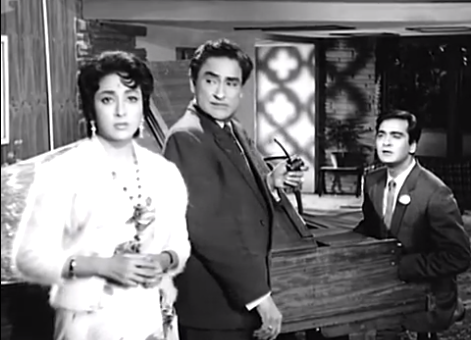The soundtrack of B.R. Chopra’s Hamraaz (1967) is remembered today for its showcasing of Mahendra Kapoor’s voice. Music director Ravi composed some unforgettable tunes for Mahendra Kapoor in this film, including “niile gagan ke tale,” “tum agar saath dene kaa vaadaa karo,” “na muu.nh chhupaake jiiyo,” and the gem that I’ve chosen to translate today: “kisii patthar kii muurat se.”
This song is found toward the beginning of Hamraaz, an entertaining murder mystery starring Sunil Dutt and newcomer Vimmi among a supporting cast of well-known names like Balraj Sahni, Helen, Mumtaz, Madan Puri, and Raaj Kumar. In the film, Sunil Dutt plays the role of a popular stage actor who falls in love with Vimmi, the daughter of a wealthy contractor, during a trip to Darjeeling. With this particular song, he serenades Vimmi around the piano at an evening soiree.
Sahir Ludhianvi was right on point when he described the film’s heroine Vimmi as a “patthar kii muurat” (a statue of stone) in this song. In an otherwise entertaining and well-produced film, Vimmi sticks out as a sore thumb for her tepid and expressionless acting. While Vimmi certainly had the beauty to make it in films, it is clear from her debut performance here that she was not cut out to become an actress. Introduced to B.R. Chopra by music director Ravi after meeting at a dinner party in Calcutta, Vimmi struggled immensely during the production of Hamraaz. Next to some of the stalwarts involved with film, Vimmi appeared to be a novice as she struggled to deliver her lines and required take after take to complete the simplest scenes. Interestingly, in spite of Vimmi’s lackluster performance, Hamraaz was a big hit when it was released. Unfortunately, Vimmi could not capitalize on the success of her debut and she failed to make a successful career for herself in the industry. Like many individuals associated with Bollywood, Vimmi’s life ended in tragedy: her family disowned her after she signed Hamraaz, her marriage fell apart a few years later, and it is said that she even turned to prostitution to finance an addiction to alcohol before her death. Quite sad, indeed. You can learn more about her tragic life by reading a surprisingly detailed Wikipedia biography here.
In any case, this song is a pure delight to listen to because of Sahir’s exquisite use of Urdu poetry combined with Mahendra Kapoor’s silky vocals. For a seemingly simple song, some of the Urdu here is quite advanced–do you know what the words parastish, taqalluf, and baghaavat mean? If not, find out by reading the glossary and translation that we’ve provided below! To learn more about another classic song produced by the Mahendra Kapoor-Sahir-Ravi combo, see our previous post on “chalo ek baar phir se” here.
-Mr. 55
Kisi Patthar Ki Murat Se Lyrics and Translation
kisii patthar kii muurat se muhabbat kaa iraadaa hai
I have intentions of loving a statue of stone.
parastish kii tamanna hai, ibaadat kaa iraadaa hai
I desire to worship it; I intend to pray to it.
jo dil kii dhaDakane.n samajhe, na aa.nkho.n kii zubaa.n samajhe
She understands neither the beating of my heart nor the language of my eyes.
nazar kii guftaguu samajhe, na jazabo.n kaa bayaa.n samajhe
She understands neither the dialogue of my glances nor the expression of my emotions.
usii ke saamane uskii shikaayat kaa iraadaa hai
I intend to air my grievances about this woman in her presence.
sunaa hai har javaan patthar ke dil me.n aag hotii hai
I have heard that a flame resides in the hearts of these young stones.
magar jab tak na chheDo, sharm ke parde me.n sotii hai
Yet, until you inflame it further, it remains asleep behind a veil of modesty.
yeh sochaa hai ki dil kii baat uske ruubaruu kah de.n
I have resolved to express my heart’s feelings to her face-to-face.
natiija kuch bhii nikale aaj apanii aarazuu kah de.n
Regardless of the outcome, I will reveal my desires to her.
har ek bejaan taqalluf se baghaavat kaa iraadaa hai
I intend to rebel against every spiritless formality today.
muhabbat berukhii se aur bhaDakegii voh kyaa jaane
Little does she know that her indifference will further arouse my love,
tabiiyat is adaa pe aur phaDakegii voh kyaa jaane
Little does she know that my disposition will be further agitated by her charm,
voh kyaa jaane ki apnaa kis qayaamat kaa iraadaa hai
And little does she know of my disastrous intentions.
kisii patthar kii muurat se muhabbat kaa iraadaa hai
I have intentions of loving a statue of stone.
Glossary
muurat: statue; iraadaa: intention; parastish: worship; tamanna: desire; ibaadat: worship; zubaa.n: language; guftaguu: dialogue, conversation; jazbaa: emotion; bayaa.n: expression; shikaayat: complaint; chheDnaa: to tease, inflame; ruubaru: face-to-face; natiija: outcome; aarazuu: desire; bejaan: spiritless; taqalluf: formality; baghaavat: rebelion; berukhii: indifference; bhaDakanaa: to arouse, flare up; tabiiyat: disposition; adaa: charm; phaDakanaa: to quiver, agitate; qayaamat: disaster.







